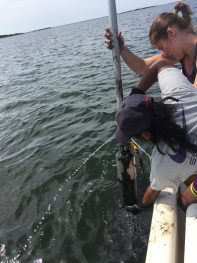Title: Forecasting rates of sediment nutrient and metal fluxes under coastal acidification for improved estuarine water quality
Year: 2020-2022
Principal Investigator/contact information:
Claudia I. Mazur (she/her)
Ph.D. Candidate, Fulweiler Lab
NOAA Margaret A. Davidson Fellow
Earth & Environment, Boston University
Email: cmazur@bu.edu
Lab Website: fulweilerlab.com
 Abstract: Coastal acidification refers to the reduction in pH of coastal waters. Unlike the open ocean, coastal acidification is driven by excess nitrogen (N). This N fuels primary productivity and the subsequent decomposition of this organic matter lowers estuarine pH. In fact, estuaries experience pH shifts of ≥ 0.5 daily. Thus, estuaries are natural laboratories in which to study how acidification alters fundamental ecosystem processes such as nutrient filtration and cycling. The purpose of this research is to determine the impact of coastal acidification on sediment N, phosphorus (P), and iron (Fe) cycling. To address this issue, I will experimentally manipulate pH in the overlying water column of sediment cores collected from Waquoit Bay, MA. Using continuous flow through incubations, I will quantify rates of sediment denitrification (microbial removal of N to di-nitrogen gas), N, P and Fe fluxes. I will use these findings and data from the WBNERR System-Wide Monitoring Program to develop a model that will predict the impact of low pH conditions on these fluxes and future water quality in Waquoit Bay. This study will be a crucial link to understanding how coastal acidification alters total ecosystem productivity, biogeochemical cycling and water quality.
Abstract: Coastal acidification refers to the reduction in pH of coastal waters. Unlike the open ocean, coastal acidification is driven by excess nitrogen (N). This N fuels primary productivity and the subsequent decomposition of this organic matter lowers estuarine pH. In fact, estuaries experience pH shifts of ≥ 0.5 daily. Thus, estuaries are natural laboratories in which to study how acidification alters fundamental ecosystem processes such as nutrient filtration and cycling. The purpose of this research is to determine the impact of coastal acidification on sediment N, phosphorus (P), and iron (Fe) cycling. To address this issue, I will experimentally manipulate pH in the overlying water column of sediment cores collected from Waquoit Bay, MA. Using continuous flow through incubations, I will quantify rates of sediment denitrification (microbial removal of N to di-nitrogen gas), N, P and Fe fluxes. I will use these findings and data from the WBNERR System-Wide Monitoring Program to develop a model that will predict the impact of low pH conditions on these fluxes and future water quality in Waquoit Bay. This study will be a crucial link to understanding how coastal acidification alters total ecosystem productivity, biogeochemical cycling and water quality.

